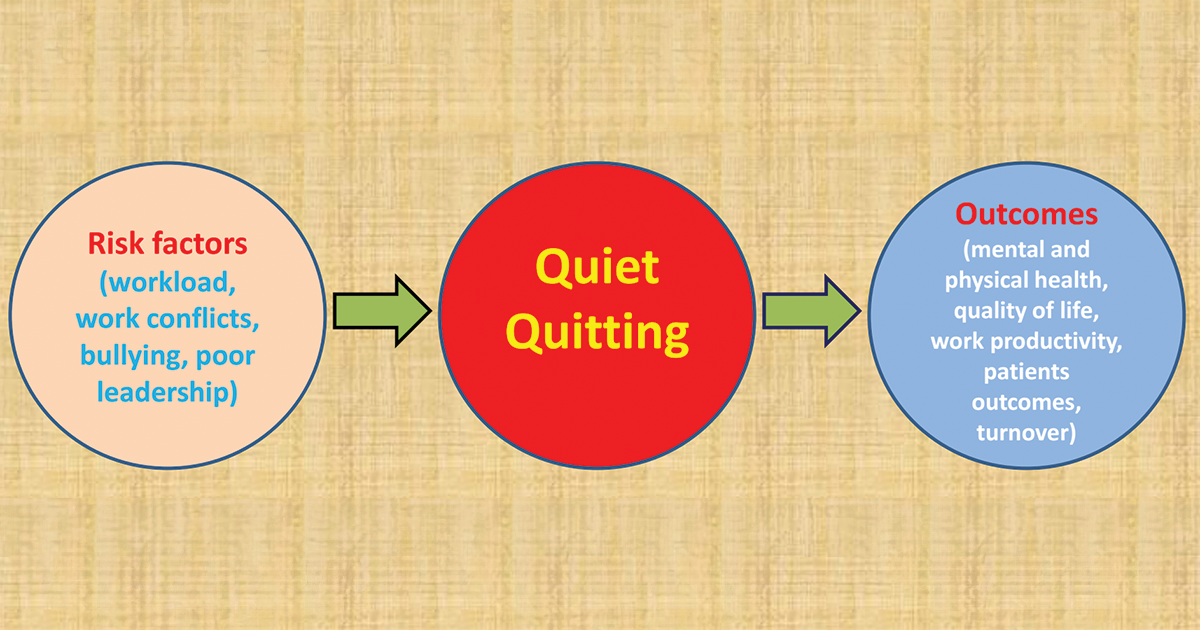Quiet Quitting: An Alarming Issue for Healthcare Professionals and Services
A special issue of Healthcare (ISSN 2227-9032). This special issue belongs to the section "Healthcare Organizations, Systems, and Providers".
Deadline for manuscript submissions: 30 May 2026 | Viewed by 3148

Special Issue Editor
Interests: research methodology; biostatistics; epidemiology
Special Issues, Collections and Topics in MDPI journals
Special Issue Information
Dear Colleagues,
Quiet quitting is a phenomenon in which employees do not leave their jobs but instead reduce their level of engagement and perform only their formal job descriptions. This is done in order to avoid burnout and improve their work-life balance. Quiet quitters refuse to compromise their well-being and health for the benefit of their organizations. However, this trend may also pose a threat to organizations as workers reduce their productivity and passion for their work. The COVID-19 pandemic has caused significant changes in the physical and mental health of healthcare professionals, who have already experienced high levels of job burnout, job dissatisfaction, work disengagement, and turnover intention. Recent data suggest that level of quiet quitting is also high among healthcare professionals, particularly nurses. However, the phenomenon of quiet quitting among healthcare professionals has not been thoroughly investigated. Future studies should quantify the levels of quiet quitting among healthcare professionals and identify potential determinants of this phenomenon. For instance, scholars could investigate the impact of socio-demographic characteristics of healthcare professionals, such as gender, age, clinical experience, work sector, geographic distribution, healthcare settings, and shift work, on levels of quiet quitting. Additionally, psychological internal and external resources, such as resilience and social support, could also affect quiet quitting within healthcare professionals. It is important for policy makers, managers, and organizations to better understand the quiet-quitting trend in order to meet the expectations and needs of healthcare professionals. This trend can be detrimental to organizations since healthcare professionals may become disengaged in organizational citizenship behaviors and may not perform to their maximum capacity.
Therefore, scholars should conduct studies to (1) measure the levels of quiet quitting among healthcare professionals, (2) identify the risk factors for quiet quitting, (3) examine the impact of quiet quitting on mental health and physical health of healthcare professionals, and (4) explore the consequences of quiet quitting. Research areas relevant to the Special Issue may include (but are not limited to) the following: Measurement of levels of quiet quitting in different countries, healthcare settings and healthcare professionals. Validation of scales that measure levels of quiet quitting (e.g., the Quiet Quitting Scale). Different levels of quiet quitting among healthcare professionals.Risk factors for quiet quitting (e.g., workload, work engagement, work conflicts, workplace bullying, leadership style). The impact of quiet quitting on mental health and physical health of healthcare professionals (e.g., stress, anxiety, depression, burnout and well-being). The impact of quiet quitting on work-related variables (e.g., job satisfaction, turnover intention, job burnout, work-related quality of life and work-life balance). The consequences of quiet quitting on healthcare services (e.g., work productivity, patients outcomes and patients safety). Preventive factors or factors that can reduce quiet quitting (e.g., moral resilience, emotional intelligence, coping strategies, leadership style, staffing levels).
You may choose our Joint Special Issue in Nursing Reports.
Dr. Petros Galanis
Guest Editor
Manuscript Submission Information
Manuscripts should be submitted online at www.mdpi.com by registering and logging in to this website. Once you are registered, click here to go to the submission form. Manuscripts can be submitted until the deadline. All submissions that pass pre-check are peer-reviewed. Accepted papers will be published continuously in the journal (as soon as accepted) and will be listed together on the special issue website. Research articles, review articles as well as short communications are invited. For planned papers, a title and short abstract (about 250 words) can be sent to the Editorial Office for assessment.
Submitted manuscripts should not have been published previously, nor be under consideration for publication elsewhere (except conference proceedings papers). All manuscripts are thoroughly refereed through a single-blind peer-review process. A guide for authors and other relevant information for submission of manuscripts is available on the Instructions for Authors page. Healthcare is an international peer-reviewed open access semimonthly journal published by MDPI.
Please visit the Instructions for Authors page before submitting a manuscript. The Article Processing Charge (APC) for publication in this open access journal is 2700 CHF (Swiss Francs). Submitted papers should be well formatted and use good English. Authors may use MDPI's English editing service prior to publication or during author revisions.
Keywords
- quiet quitting
- healthcare professionals
- healthcare services
- healthcare settings
- healthcare professionals
- healthcare workers
- workers
- workload
- work engagement
- work conflicts
- workplace bullying
- leadership style
- stress
- anxiety
- depression
- burnout
- well-being, job satisfaction
- turnover intention
- job burnout
- work-related quality of life
- work–life balance
- work productivity
- patient outcomes
- patient safety
- moral resilience
- emotional intelligence
- coping strategies
- staffing levels
Benefits of Publishing in a Special Issue
- Ease of navigation: Grouping papers by topic helps scholars navigate broad scope journals more efficiently.
- Greater discoverability: Special Issues support the reach and impact of scientific research. Articles in Special Issues are more discoverable and cited more frequently.
- Expansion of research network: Special Issues facilitate connections among authors, fostering scientific collaborations.
- External promotion: Articles in Special Issues are often promoted through the journal's social media, increasing their visibility.
- Reprint: MDPI Books provides the opportunity to republish successful Special Issues in book format, both online and in print.
Further information on MDPI's Special Issue policies can be found here.






